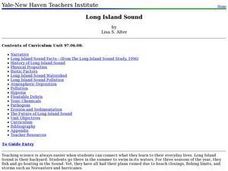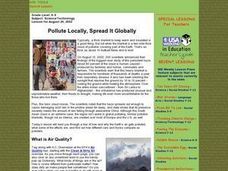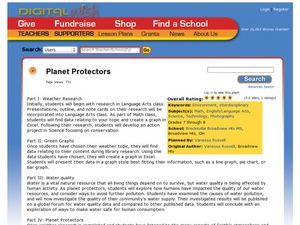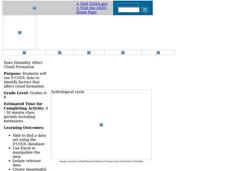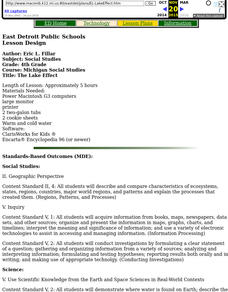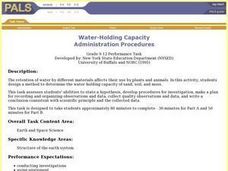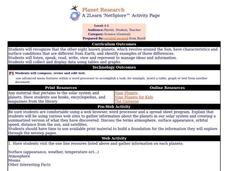Curated OER
Aquifers and Groundwater
Students understand the purpose of an aquifer. In this aquifer and groundwater activity, students build a model aquifer find its relationship to water usage. Students record observations as they build the layers of the aquifer.
Curated OER
Food Webs in the Barnegat Bay
Students investigate the food webs in the Barnegat Bay. In this organisms lesson, students use a graphic organizer to illustrate the types of consumers in the bay. Students use reference books to continue to research the animals found in...
Curated OER
Long Island Sound
Students use the Internet to research the history of Long Island Sound. In groups, they identify the sources of point and nonpoint pollution and how humans are impacting the area. After watching a video, they discuss the role of...
Curated OER
Pollute Locally, Spread It Globally
Students examine the rate of pollution throughout the world through an interactive program. They define air quality and the air quality index. They examine fuel economy and its impact on the Earth and renewable and nonrenewable resources.
Curated OER
Sea and Ice Salinity
Students conduct an experiment. In this salinity lesson, students learn about sea ice, why it is important and how changing amounts can affect the sea. Students conduct an experiment to find out the effects of salinity on the...
Alabama Learning Exchange
Researching Hurricanes with Technology
Young scholars explain the components that make up a hurricane.
Curated OER
Planet Protectors
Students explore ways to protect the earth. In this environmental issues and technology instructional activity, students investigate the water quality in their community and compare their findings to the water quality in other...
Curated OER
Classification of Clouds
Students view a cloud slide show presentation and identify types of clouds. They estimate height based on cloud's appearance. They discuss the vague nature of cloud nomenclature and compare it to the English standard measurement system.
Curated OER
Does Humidity Affect Cloud Formation?
Students use NASA's S'COOL database to identify factors that affect cloud formation.
Curated OER
Acid and Rain and Its Effects
Students work in groups for up to three weeks to investigate the possibility of acid rain in your area and to investigate the damage that acid rain can do to buildings, monuments, and plants. Each group prepares a report to local...
Curated OER
The Lake Effect
Fourth graders conduct an experiment demonstrating the effects of water and air temperature on precipitation. They create graphs demonstrating their findings using Claris Works for Kids.
Curated OER
Understanding Cloud Formation
Students view a demonstration that simulates cloud formation. They read a poem about clouds, participate in a class demonstration using warm water and ice and write a paragraph summarizing their observations.
Curated OER
Water-Holding Capacity
Learners design and conduct an experiment to compare the water-holding capacity of sand, soil, and moss. They measure the change in weight for each material after adding the same amount of water to each material.
Curated OER
Seasons
First graders create a KWL chart about the four seasons. In this four seasons lesson plan, 1st graders continue the chart by watching videos and drawings.
Curated OER
Science: Hurricanes As Heat Engines
Pupils conduct Internet research to track the path of Hurricane Rita. They record the sea surface temperature of the Gulf of Mexico during and after the hurricane and draw conclusions about how hurricanes extract heat energy from the...
Curated OER
Science: Trouble in the Troposphere
Learners research a NASA Website and record information about an assigned city's tropospheric ozone residual monthly climate. In groups, they graph the information for the past year. They form new groups and compare their city's...
Curated OER
Effects of Ozone in the Air
Fifth graders learn how ground-level ozone is an air pollution problem. Students measure ozone levels and graph the results.
Curated OER
Planet Research
Students recognize that the other eight known planets, which revolve around the Sun, have characteristics and surface conditions that are different from Earth; and identify examples of those differences.
Curated OER
Twister Redux
Pupils pick up science knowledge as they track and examine natural disasters. They keep a daily journal of results and reflections. Students get to follow a real tornado chaser and learn thunderstorm formation. They incorporate how...
Curated OER
Introduction to the Barnegat Bay Estuary
Young scholars research estuaries. For this estuaries lesson, students discuss the differences in a bay and an ocean. Young scholars watch a PowerPoint of the properties of the estuaries and geography of Barnegat Bay. Students complete a...
Curated OER
Algebra, Multiplication, and Division of Fractions
Students gain knowledge by measuring time and distance for solving unknowns in an equation. They also will design an airplane and chance to communicate mathematically by writing essays.
Curated OER
Cloud Shadows
Students classify clouds as transparent, translucent or opaque. They conduct an experiment to determine the visual opacity of several classroom objects and then conduct further observations of clouds.
Curated OER
Nature's Air Conditioner
Students observe the process of transpiration in leaves. They measure how much water a leaf gives off in a 24-hour period, calculate the volume, and answer discussion questions.
NASA
Nasa: Using Radiosonde Data From a Weather Balloon Launch
This lesson plan allows students to learn about the layers of the atmosphere and to learn how to graph real atmospheric data.




